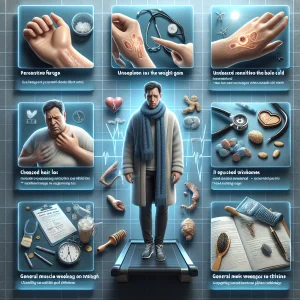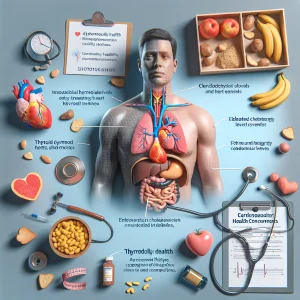Understanding the Serious Health Risks Associated with Hypothyroidism in Men
Hypothyroidism in men represents a critical health challenge marked by the thyroid gland’s failure to produce adequate levels of vital thyroid hormones. These hormones, notably thyroxine (T4) and triiodothyronine (T3), are essential for regulating numerous bodily functions, such as metabolic processes, energy levels, and general wellness. Although this condition can affect anyone, men often face specific symptoms and difficulties that can drastically diminish their quality of life. Gaining a thorough understanding of hypothyroidism is crucial for effective management and treatment, enabling individuals to pursue appropriate medical care and improve their overall health outcomes.
Identifying the unique features of hypothyroidism is essential for implementing effective treatment and management tactics. Frequently, men may overlook the signs of this condition due to their subtle nature, mistakenly attributing them to stress, lifestyle changes, or the natural aging process. This common oversight can lead to persistent discomfort, complications, and a marked deterioration in well-being if not addressed promptly. Consequently, early detection is imperative for achieving the best possible health outcomes and maintaining a high quality of life.
The root causes of hypothyroidism are varied and can include autoimmune conditions such as Hashimoto’s thyroiditis, side effects from certain medications, or complications stemming from radiation therapy. Recognizing and understanding the symptoms early is critical for timely intervention, which can significantly enhance health and improve overall quality of life.
Essential Information About Hypothyroidism That Every Man Should Be Aware Of
- Hypothyroidism in men indicates a deficiency in thyroid hormone production by the thyroid gland, leading to a range of physical and psychological health issues that necessitate attention.
- Physical manifestations of hypothyroidism often include chronic fatigue, unanticipated weight gain, hair thinning, and muscle weakness. Additionally, this condition can lead to elevated cholesterol levels, increasing the risk of heart disease and diabetes.
- The emotional and mental repercussions of hypothyroidism in men may encompass depression, anxiety, and cognitive difficulties, significantly affecting overall life satisfaction and daily functioning.
- Hypothyroidism can detrimentally impact sexual health, leading to reduced libido, erectile dysfunction, and potential fertility issues, which can place considerable stress on intimate relationships.
- Men with hypothyroidism frequently struggle with weight management, as the condition slows down metabolic rates, complicating weight loss efforts and necessitating tailored dietary and exercise strategies.
 Identifying the Physical Symptoms and Health Risks Associated with Hypothyroidism
Identifying the Physical Symptoms and Health Risks Associated with Hypothyroidism
The physical symptoms linked to hypothyroidism can differ greatly from one individual to another. Commonly reported symptoms among men include chronic fatigue, sudden weight gain, increased sensitivity to cold, and generalized muscle weakness. Many individuals find themselves feeling drained, even after a full night’s rest, or struggling to lose weight despite adhering to a healthy diet and active lifestyle. Such physical challenges can lead to self-doubt regarding personal fitness and overall health.
Moreover, hypothyroidism can present in more subtle ways, such as noticeable changes in skin texture, including dryness and pallor, alongside increased hair loss or thinning. Addressing these issues early is crucial for effective management and can help prevent further complications related to the condition. Additionally, a decreased heart rate may occur, contributing to feelings of lethargy and reduced stamina during physical activities.
The cumulative impact of these physical symptoms can significantly disrupt daily routines and overall functionality. Therefore, seeking medical advice is essential if you suspect that hypothyroidism may be compromising your health and well-being.
Understanding the Mental and Emotional Challenges Associated with Hypothyroidism
The mental and emotional ramifications of hypothyroidism are frequently underestimated, yet they hold significant importance. As thyroid hormone levels decline, individuals may encounter mood fluctuations, increased feelings of depression, or heightened anxiety. These emotional changes can lead to irritability and persistent fatigue, straining personal relationships and diminishing overall life satisfaction.
Research underscores the intricate link between thyroid function and mental health, highlighting the necessity of acknowledging this connection for effective management. Cognitive abilities may also decline due to hypothyroidism, leading to experiences often described as “brain fog.” You might struggle to focus, forget minor tasks, or feel mentally sluggish, particularly in fast-paced settings where clarity is vital.
Recognizing these cognitive and emotional symptoms is crucial for advocating appropriate medical intervention. For additional insights into the complex relationship between hypothyroidism and mental health, you may wish to visit the Mayo Clinic website, which offers comprehensive information.
 The Significant Effects of Hypothyroidism on Men’s Sexual Health
The Significant Effects of Hypothyroidism on Men’s Sexual Health
Hypothyroidism can profoundly impact sexual health in men, resulting in a range of complications. Reduced levels of thyroid hormones may lead to decreased libido, erectile dysfunction, and even infertility. You might notice a significant drop in interest in sexual activities or experience challenges in achieving or sustaining an erection, which can be distressing.
These sexual health issues can foster feelings of inadequacy, frustration, or anxiety within intimate relationships. Furthermore, the hormonal imbalances triggered by hypothyroidism can disrupt testosterone levels, complicating the already intricate dynamics of sexual health. Low testosterone may lead to increased fatigue, mood swings, and diminished sexual desire, creating a challenging cycle that may appear difficult to break.
It is vital to discuss these sexual health concerns with your healthcare provider to explore effective treatment options aimed at restoring both thyroid function and sexual health, ensuring a comprehensive approach to overall well-being.
Effective Strategies for Managing Weight Challenges Associated with Hypothyroidism
Weight management often becomes particularly difficult for men diagnosed with hypothyroidism. The slowed metabolism typically linked to low thyroid hormone levels can obstruct your ability to achieve or maintain a healthy weight. Despite consistent exercise and a balanced diet, you may find that losing those extra pounds feels like an uphill battle, leading to feelings of frustration and despair regarding weight management.
Understanding the relationship between hypothyroidism and weight gain is essential for developing effective strategies that work. Collaborating with a healthcare provider can assist you in crafting a personalized plan that focuses on both thyroid health and weight management goals. This plan may involve adjustments to medication, dietary changes, and customized exercise routines designed to stimulate metabolism in line with your energy levels.
 Investigating the Link Between Hypothyroidism and Cardiovascular Health Risks
Investigating the Link Between Hypothyroidism and Cardiovascular Health Risks
The connection between hypothyroidism and cardiovascular health raises significant concerns for men diagnosed with this condition. Low thyroid hormone levels can result in elevated cholesterol levels, increasing the risk of heart disease over time. It’s essential to realize that the fatigue and lethargy often experienced may not only signify hypothyroidism but could also indicate underlying cardiovascular issues that need attention.
Regular cardiovascular health assessments are vital for individuals diagnosed with hypothyroidism. Your healthcare provider may suggest lifestyle modifications, such as adopting a heart-healthy diet rich in fruits, vegetables, whole grains, and lean proteins. Additionally, engaging in regular physical activity that aligns with your energy levels can promote thyroid function and enhance cardiovascular health. By proactively managing both thyroid health and cardiovascular fitness, you can significantly mitigate the risk of further complications.
Understanding the Impact of Hypothyroidism on Male Fertility: Key Insights
Fertility challenges are another essential aspect linked to hypothyroidism in men. Reduced levels of thyroid hormones can disrupt the delicate hormonal equilibrium necessary for sperm production and overall reproductive health. If you are encountering difficulties in conceiving, it is crucial to consider how your thyroid function may be influencing your fertility journey.
Effectively managing hypothyroidism through appropriate treatment can not only enhance your overall health but also increase the likelihood of successful conception. Collaborating with a knowledgeable healthcare provider who understands the complex relationship between thyroid function and fertility is vital for developing a comprehensive strategy that addresses both issues. This may include regular hormone level monitoring through blood tests and medication adjustments aimed at optimizing reproductive health.
Comprehensive Approaches for Effectively Managing and Treating Hypothyroidism in Men
Successfully managing hypothyroidism necessitates a holistic approach that encompasses regular monitoring through blood tests, medication management, lifestyle changes, and open communication with healthcare professionals. Blood tests are pivotal for diagnosing hypothyroidism, as they assess critical indicators such as Thyroid-Stimulating Hormone (TSH) and T4 levels. Elevated TSH levels usually indicate an underactive thyroid, while low T4 levels confirm the diagnosis.
Upon diagnosis, treatment typically involves hormone replacement therapy using synthetic thyroid hormones, such as levothyroxine. This medication aids in restoring normal hormone levels, alleviating many symptoms associated with hypothyroidism. Regular follow-ups are essential for evaluating treatment effectiveness and making necessary modifications based on blood test results.
In addition to medication, lifestyle adaptations — such as adopting a nutrient-rich diet that supports thyroid health, including sufficient iodine, selenium, and zinc — can be advantageous. Engaging in regular exercise tailored to your energy levels can also help manage symptoms while promoting overall well-being. By actively participating in your health management through education, collaboration with healthcare providers, and lifestyle changes, you can lead a fulfilling life despite the challenges presented by hypothyroidism.
Common Questions About Hypothyroidism in Men
What is hypothyroidism in men?
Hypothyroidism in men refers to a condition where the thyroid gland does not produce enough thyroid hormones, resulting in metabolic slowdown and various health complications that require attention.
What symptoms are commonly associated with hypothyroidism in men?
Common symptoms experienced by men with hypothyroidism include persistent fatigue, weight gain, cold sensitivity, dry skin, constipation, muscle weakness, and feelings of depression, all of which can significantly impact daily life.
How is hypothyroidism diagnosed in men?
The diagnosis of hypothyroidism in men is confirmed through blood tests that measure levels of thyroid-stimulating hormone (TSH) and thyroxine (T4) in the bloodstream, which help evaluate thyroid function and health.
What factors contribute to hypothyroidism in men?
The primary cause of hypothyroidism in men is often an autoimmune disorder known as Hashimoto’s thyroiditis. Other factors may include thyroid surgery, radiation treatment, and certain medications that can interfere with thyroid hormone production.
What treatment options are available for men suffering from hypothyroidism?
Men diagnosed with hypothyroidism typically receive treatment through synthetic thyroid hormone medications, such as levothyroxine, which help to replace deficient hormones and restore normal thyroid function, thereby improving overall health.
Can hypothyroidism lead to additional health complications in men?
If left untreated, hypothyroidism in men can result in serious complications, including heart disease, fertility challenges, and mental health issues. Seeking appropriate treatment is crucial to mitigate these risks and safeguard overall health.
This Content Is Sponsored By: Thyroid Testing UK
Hypothyroidism in Men: The Impact On Health Was First Published By https://bloodtest.co.uk
Find Us On Facebook: EZ Blood Tests
The Article: Hypothyroidism in Men: Health Implications Explored appeared first on: https://ezbloodtest.com
The Article Hypothyroidism in Men: Exploring Health Implications Was Found On https://limitsofstrategy.com




It’s really illuminating to dive into the impact of hypothyroidism, especially as it pertains to men. It’s often seen as a condition that primarily affects women, which can lead to a significant underdiagnosis and misunderstanding on the part of many guys. I think you really hit the nail on the head when you mention the subtlety of symptoms. A lot of men, myself included, tend to shrug off feelings of fatigue or weight gain as just part of getting older or a reflection of lifestyle choices. It wasn’t until I started noticing changes that went beyond the usual “dad bod” territory that I took a step back and considered something more serious.
You’ve touched on something crucial. The common perception is that hypothyroidism mainly affects women, which can definitely lead men to overlook their symptoms. It’s easy to dismiss fatigue and weight gain as just part of life. Many of us think we’re just aging or not keeping up with our routines. But as you’ve pointed out, when those everyday changes start becoming more noticeable, it can signal something deeper.
This post highlights an essential yet often overlooked aspect of men’s health. You mentioned how subtle the symptoms of hypothyroidism can be, and I can relate to that. I recall a friend who struggled with fatigue, weight gain, and even mood swings, but he brushed them off as just signs of getting older. It took a considerable amount of discomfort before he finally sought help and was diagnosed with hypothyroidism.
It’s interesting how often those symptoms can be dismissed as just part of aging. Many guys face that kind of fatigue or mood changes and just assume it’s something they have to deal with. Your friend’s experience shows how crucial it is to listen to our bodies and not brush things off.
It’s interesting how we tend to normalize symptoms like fatigue and mood swings, writing them off as just part of aging. Your friend’s experience really highlights the need for awareness around conditions like hypothyroidism, which can sneak up on us. It’s not uncommon for men to dismiss those signs, thinking they just need to push through.
You’ve touched on a crucial point that resonates deeply with many people. It’s easy to brush off fatigue and mood swings as just another part of getting older, especially for men who often pride themselves on toughing things out. We live in a culture that encourages pushing through discomfort and seeing it as a sign of strength. But what if those symptoms are signals from our bodies that shouldn’t be ignored?
You hit the nail on the head there. It’s all too easy to brush off fatigue and mood swings as just part of getting older. We’ve been conditioned to think that feeling sluggish or irritable is just something we have to accept as life goes on. It’s kind of like that old saying, “Just man up and deal with it,” which is not only outdated but also pretty harmful.
It’s interesting how often we dismiss those subtle signs as just part of aging. Your friend’s experience isn’t unique; many men might brush off symptoms like fatigue or mood changes, thinking they’re simply part of life. Hypothyroidism can be sneaky, creeping in with such vague indicators that it’s easy to misinterpret them or just chalk them up to stress or natural declines in energy.